Strategic Challenges in International Business for TCS Analysis
VerifiedAdded on 2020/03/04
|14
|3879
|43
Essay
AI Summary
This essay examines the strategic challenges in international business, focusing on offshoring strategies and their implications for companies like Tata Consultancy Services (TCS). It delves into critical determinants for successful offshoring, including cost analysis, location selection, and the nature of the business. The essay highlights the importance of considering transaction costs, hidden expenses, and currency fluctuations when evaluating offshoring costs. It also emphasizes the need to assess resource availability, infrastructure, and skilled labor when choosing offshoring locations. Furthermore, the essay stresses the significance of understanding cultural aspects and the nature of the business before initiating offshoring activities. The analysis considers the impact of regulations and the evolving global business landscape, providing insights into the complexities of international business strategy.
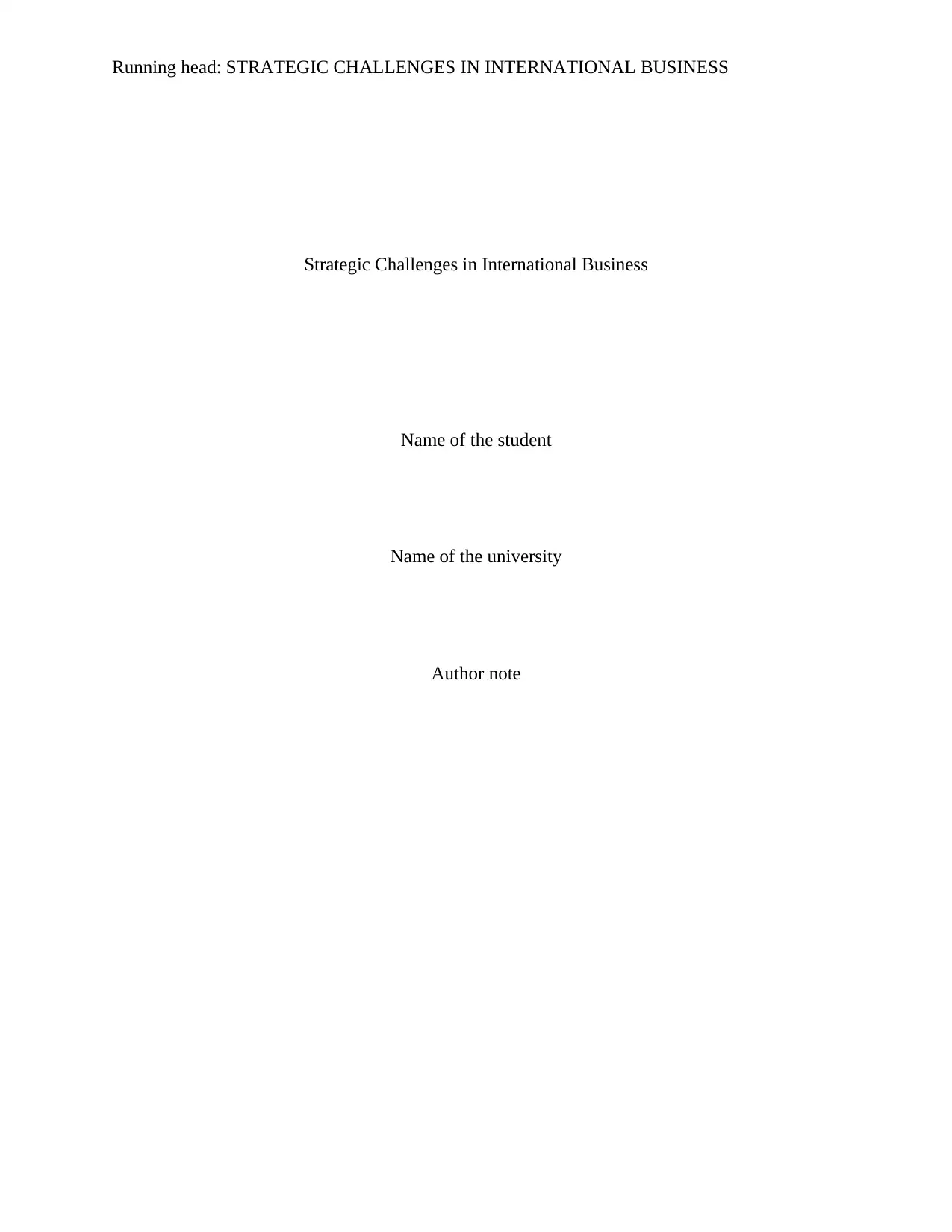
Running head: STRATEGIC CHALLENGES IN INTERNATIONAL BUSINESS
Strategic Challenges in International Business
Name of the student
Name of the university
Author note
Strategic Challenges in International Business
Name of the student
Name of the university
Author note
Paraphrase This Document
Need a fresh take? Get an instant paraphrase of this document with our AI Paraphraser
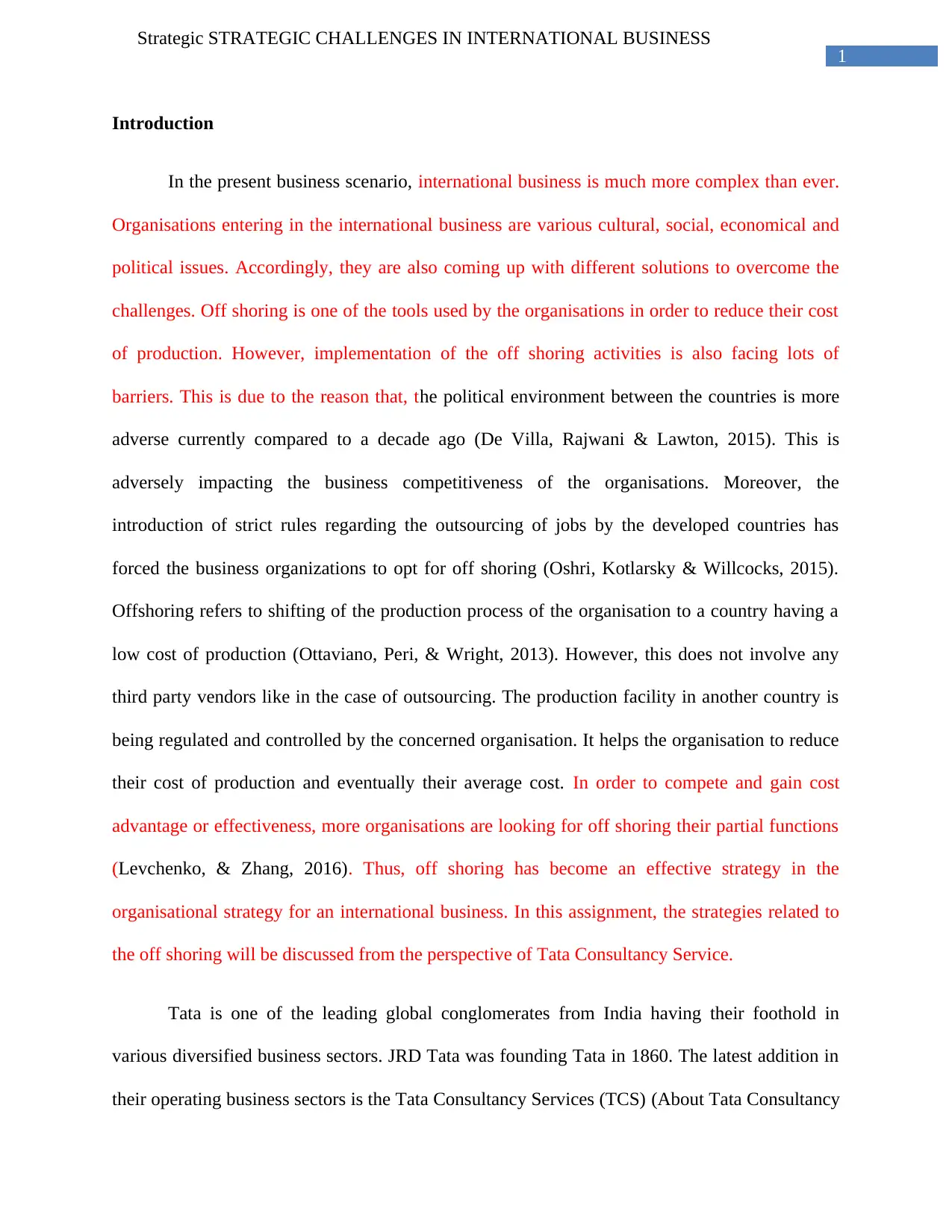
1
Strategic STRATEGIC CHALLENGES IN INTERNATIONAL BUSINESS
Introduction
In the present business scenario, international business is much more complex than ever.
Organisations entering in the international business are various cultural, social, economical and
political issues. Accordingly, they are also coming up with different solutions to overcome the
challenges. Off shoring is one of the tools used by the organisations in order to reduce their cost
of production. However, implementation of the off shoring activities is also facing lots of
barriers. This is due to the reason that, the political environment between the countries is more
adverse currently compared to a decade ago (De Villa, Rajwani & Lawton, 2015). This is
adversely impacting the business competitiveness of the organisations. Moreover, the
introduction of strict rules regarding the outsourcing of jobs by the developed countries has
forced the business organizations to opt for off shoring (Oshri, Kotlarsky & Willcocks, 2015).
Offshoring refers to shifting of the production process of the organisation to a country having a
low cost of production (Ottaviano, Peri, & Wright, 2013). However, this does not involve any
third party vendors like in the case of outsourcing. The production facility in another country is
being regulated and controlled by the concerned organisation. It helps the organisation to reduce
their cost of production and eventually their average cost. In order to compete and gain cost
advantage or effectiveness, more organisations are looking for off shoring their partial functions
(Levchenko, & Zhang, 2016). Thus, off shoring has become an effective strategy in the
organisational strategy for an international business. In this assignment, the strategies related to
the off shoring will be discussed from the perspective of Tata Consultancy Service.
Tata is one of the leading global conglomerates from India having their foothold in
various diversified business sectors. JRD Tata was founding Tata in 1860. The latest addition in
their operating business sectors is the Tata Consultancy Services (TCS) (About Tata Consultancy
Strategic STRATEGIC CHALLENGES IN INTERNATIONAL BUSINESS
Introduction
In the present business scenario, international business is much more complex than ever.
Organisations entering in the international business are various cultural, social, economical and
political issues. Accordingly, they are also coming up with different solutions to overcome the
challenges. Off shoring is one of the tools used by the organisations in order to reduce their cost
of production. However, implementation of the off shoring activities is also facing lots of
barriers. This is due to the reason that, the political environment between the countries is more
adverse currently compared to a decade ago (De Villa, Rajwani & Lawton, 2015). This is
adversely impacting the business competitiveness of the organisations. Moreover, the
introduction of strict rules regarding the outsourcing of jobs by the developed countries has
forced the business organizations to opt for off shoring (Oshri, Kotlarsky & Willcocks, 2015).
Offshoring refers to shifting of the production process of the organisation to a country having a
low cost of production (Ottaviano, Peri, & Wright, 2013). However, this does not involve any
third party vendors like in the case of outsourcing. The production facility in another country is
being regulated and controlled by the concerned organisation. It helps the organisation to reduce
their cost of production and eventually their average cost. In order to compete and gain cost
advantage or effectiveness, more organisations are looking for off shoring their partial functions
(Levchenko, & Zhang, 2016). Thus, off shoring has become an effective strategy in the
organisational strategy for an international business. In this assignment, the strategies related to
the off shoring will be discussed from the perspective of Tata Consultancy Service.
Tata is one of the leading global conglomerates from India having their foothold in
various diversified business sectors. JRD Tata was founding Tata in 1860. The latest addition in
their operating business sectors is the Tata Consultancy Services (TCS) (About Tata Consultancy
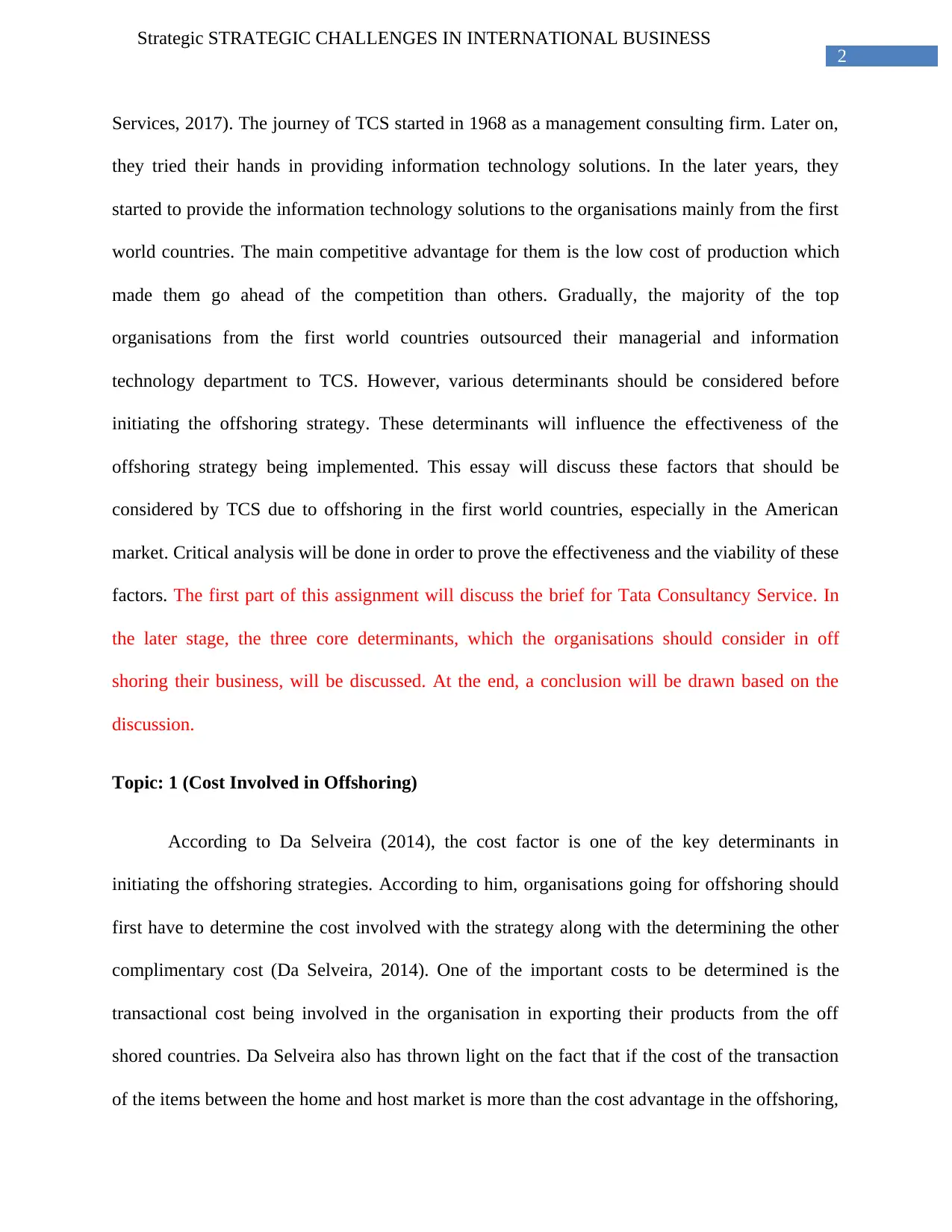
2
Strategic STRATEGIC CHALLENGES IN INTERNATIONAL BUSINESS
Services, 2017). The journey of TCS started in 1968 as a management consulting firm. Later on,
they tried their hands in providing information technology solutions. In the later years, they
started to provide the information technology solutions to the organisations mainly from the first
world countries. The main competitive advantage for them is the low cost of production which
made them go ahead of the competition than others. Gradually, the majority of the top
organisations from the first world countries outsourced their managerial and information
technology department to TCS. However, various determinants should be considered before
initiating the offshoring strategy. These determinants will influence the effectiveness of the
offshoring strategy being implemented. This essay will discuss these factors that should be
considered by TCS due to offshoring in the first world countries, especially in the American
market. Critical analysis will be done in order to prove the effectiveness and the viability of these
factors. The first part of this assignment will discuss the brief for Tata Consultancy Service. In
the later stage, the three core determinants, which the organisations should consider in off
shoring their business, will be discussed. At the end, a conclusion will be drawn based on the
discussion.
Topic: 1 (Cost Involved in Offshoring)
According to Da Selveira (2014), the cost factor is one of the key determinants in
initiating the offshoring strategies. According to him, organisations going for offshoring should
first have to determine the cost involved with the strategy along with the determining the other
complimentary cost (Da Selveira, 2014). One of the important costs to be determined is the
transactional cost being involved in the organisation in exporting their products from the off
shored countries. Da Selveira also has thrown light on the fact that if the cost of the transaction
of the items between the home and host market is more than the cost advantage in the offshoring,
Strategic STRATEGIC CHALLENGES IN INTERNATIONAL BUSINESS
Services, 2017). The journey of TCS started in 1968 as a management consulting firm. Later on,
they tried their hands in providing information technology solutions. In the later years, they
started to provide the information technology solutions to the organisations mainly from the first
world countries. The main competitive advantage for them is the low cost of production which
made them go ahead of the competition than others. Gradually, the majority of the top
organisations from the first world countries outsourced their managerial and information
technology department to TCS. However, various determinants should be considered before
initiating the offshoring strategy. These determinants will influence the effectiveness of the
offshoring strategy being implemented. This essay will discuss these factors that should be
considered by TCS due to offshoring in the first world countries, especially in the American
market. Critical analysis will be done in order to prove the effectiveness and the viability of these
factors. The first part of this assignment will discuss the brief for Tata Consultancy Service. In
the later stage, the three core determinants, which the organisations should consider in off
shoring their business, will be discussed. At the end, a conclusion will be drawn based on the
discussion.
Topic: 1 (Cost Involved in Offshoring)
According to Da Selveira (2014), the cost factor is one of the key determinants in
initiating the offshoring strategies. According to him, organisations going for offshoring should
first have to determine the cost involved with the strategy along with the determining the other
complimentary cost (Da Selveira, 2014). One of the important costs to be determined is the
transactional cost being involved in the organisation in exporting their products from the off
shored countries. Da Selveira also has thrown light on the fact that if the cost of the transaction
of the items between the home and host market is more than the cost advantage in the offshoring,
⊘ This is a preview!⊘
Do you want full access?
Subscribe today to unlock all pages.

Trusted by 1+ million students worldwide
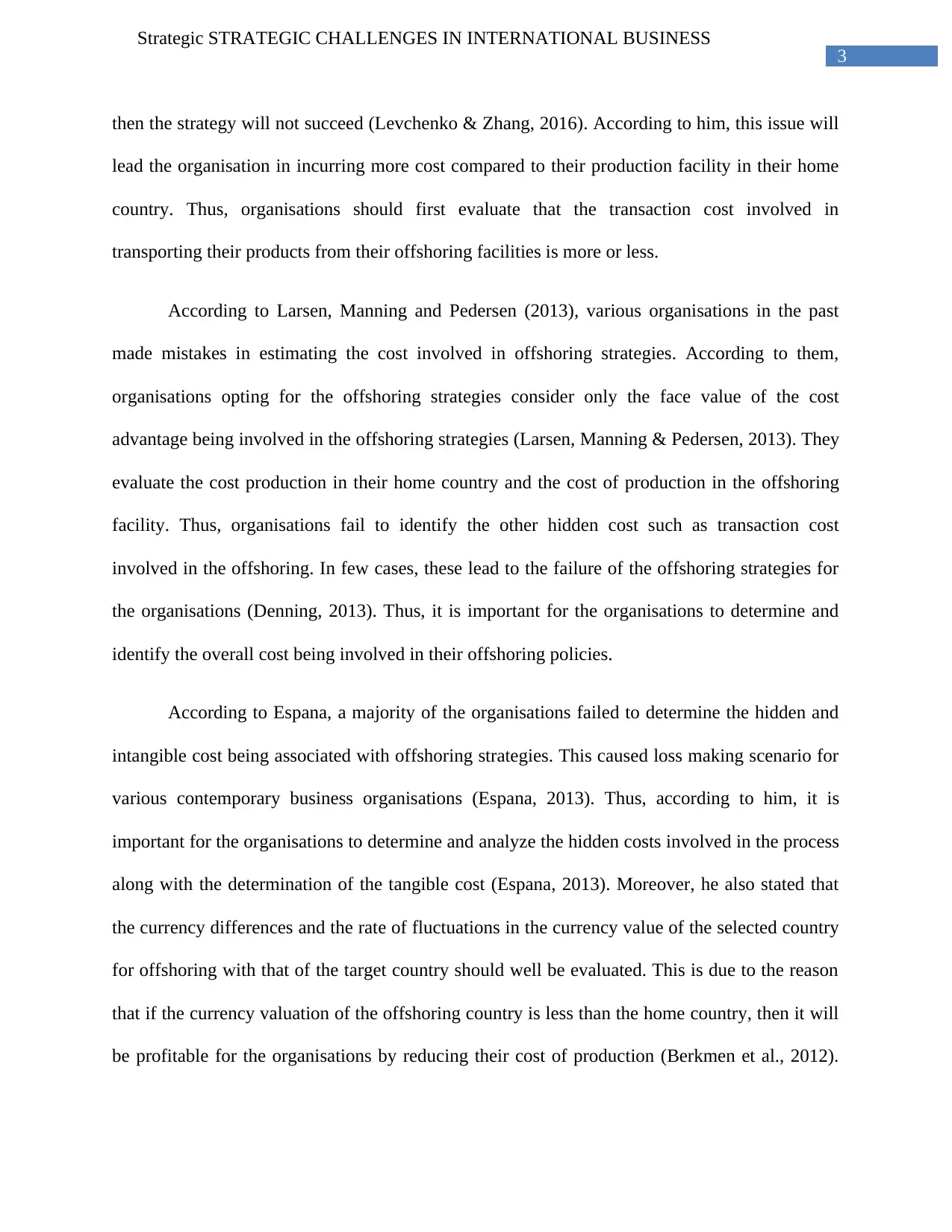
3
Strategic STRATEGIC CHALLENGES IN INTERNATIONAL BUSINESS
then the strategy will not succeed (Levchenko & Zhang, 2016). According to him, this issue will
lead the organisation in incurring more cost compared to their production facility in their home
country. Thus, organisations should first evaluate that the transaction cost involved in
transporting their products from their offshoring facilities is more or less.
According to Larsen, Manning and Pedersen (2013), various organisations in the past
made mistakes in estimating the cost involved in offshoring strategies. According to them,
organisations opting for the offshoring strategies consider only the face value of the cost
advantage being involved in the offshoring strategies (Larsen, Manning & Pedersen, 2013). They
evaluate the cost production in their home country and the cost of production in the offshoring
facility. Thus, organisations fail to identify the other hidden cost such as transaction cost
involved in the offshoring. In few cases, these lead to the failure of the offshoring strategies for
the organisations (Denning, 2013). Thus, it is important for the organisations to determine and
identify the overall cost being involved in their offshoring policies.
According to Espana, a majority of the organisations failed to determine the hidden and
intangible cost being associated with offshoring strategies. This caused loss making scenario for
various contemporary business organisations (Espana, 2013). Thus, according to him, it is
important for the organisations to determine and analyze the hidden costs involved in the process
along with the determination of the tangible cost (Espana, 2013). Moreover, he also stated that
the currency differences and the rate of fluctuations in the currency value of the selected country
for offshoring with that of the target country should well be evaluated. This is due to the reason
that if the currency valuation of the offshoring country is less than the home country, then it will
be profitable for the organisations by reducing their cost of production (Berkmen et al., 2012).
Strategic STRATEGIC CHALLENGES IN INTERNATIONAL BUSINESS
then the strategy will not succeed (Levchenko & Zhang, 2016). According to him, this issue will
lead the organisation in incurring more cost compared to their production facility in their home
country. Thus, organisations should first evaluate that the transaction cost involved in
transporting their products from their offshoring facilities is more or less.
According to Larsen, Manning and Pedersen (2013), various organisations in the past
made mistakes in estimating the cost involved in offshoring strategies. According to them,
organisations opting for the offshoring strategies consider only the face value of the cost
advantage being involved in the offshoring strategies (Larsen, Manning & Pedersen, 2013). They
evaluate the cost production in their home country and the cost of production in the offshoring
facility. Thus, organisations fail to identify the other hidden cost such as transaction cost
involved in the offshoring. In few cases, these lead to the failure of the offshoring strategies for
the organisations (Denning, 2013). Thus, it is important for the organisations to determine and
identify the overall cost being involved in their offshoring policies.
According to Espana, a majority of the organisations failed to determine the hidden and
intangible cost being associated with offshoring strategies. This caused loss making scenario for
various contemporary business organisations (Espana, 2013). Thus, according to him, it is
important for the organisations to determine and analyze the hidden costs involved in the process
along with the determination of the tangible cost (Espana, 2013). Moreover, he also stated that
the currency differences and the rate of fluctuations in the currency value of the selected country
for offshoring with that of the target country should well be evaluated. This is due to the reason
that if the currency valuation of the offshoring country is less than the home country, then it will
be profitable for the organisations by reducing their cost of production (Berkmen et al., 2012).
Paraphrase This Document
Need a fresh take? Get an instant paraphrase of this document with our AI Paraphraser
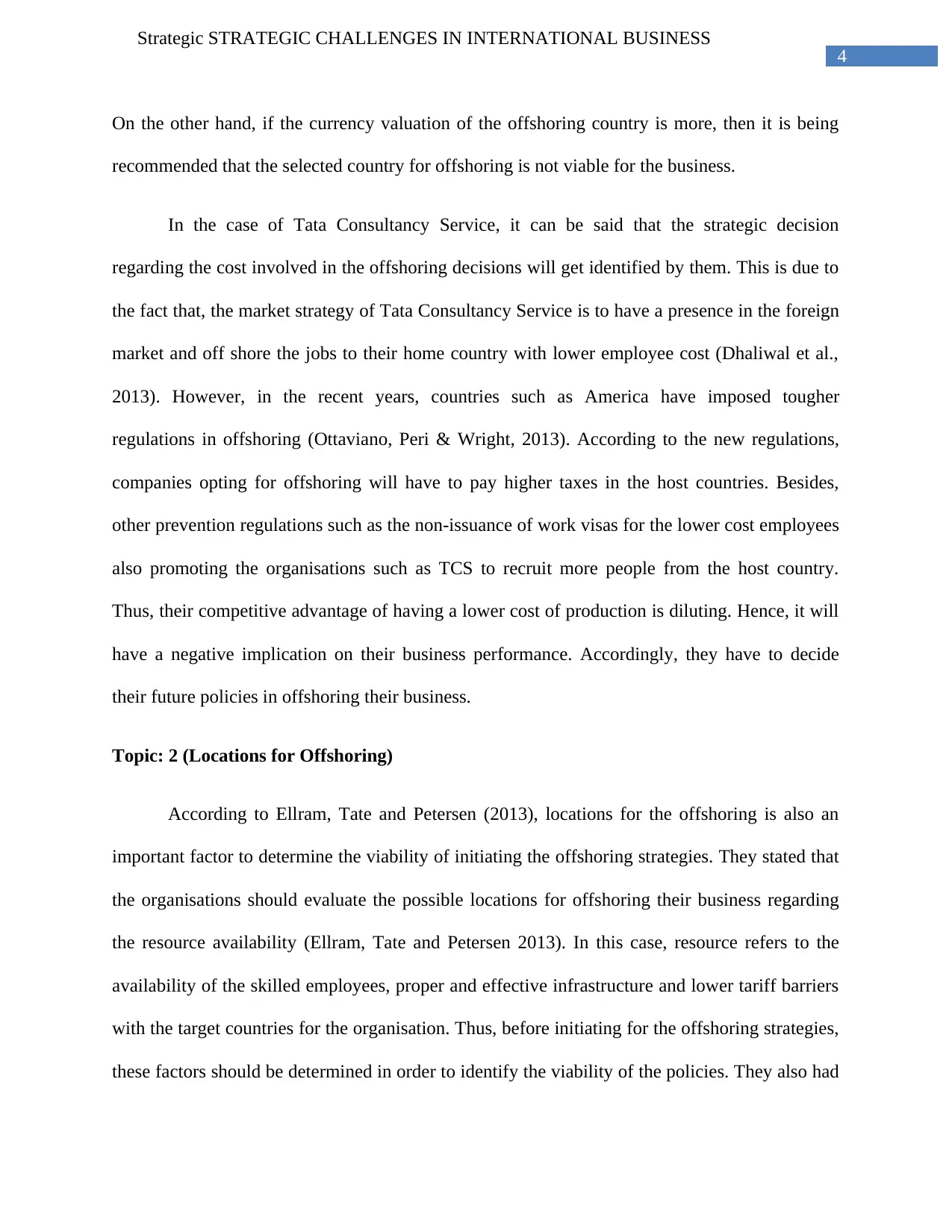
4
Strategic STRATEGIC CHALLENGES IN INTERNATIONAL BUSINESS
On the other hand, if the currency valuation of the offshoring country is more, then it is being
recommended that the selected country for offshoring is not viable for the business.
In the case of Tata Consultancy Service, it can be said that the strategic decision
regarding the cost involved in the offshoring decisions will get identified by them. This is due to
the fact that, the market strategy of Tata Consultancy Service is to have a presence in the foreign
market and off shore the jobs to their home country with lower employee cost (Dhaliwal et al.,
2013). However, in the recent years, countries such as America have imposed tougher
regulations in offshoring (Ottaviano, Peri & Wright, 2013). According to the new regulations,
companies opting for offshoring will have to pay higher taxes in the host countries. Besides,
other prevention regulations such as the non-issuance of work visas for the lower cost employees
also promoting the organisations such as TCS to recruit more people from the host country.
Thus, their competitive advantage of having a lower cost of production is diluting. Hence, it will
have a negative implication on their business performance. Accordingly, they have to decide
their future policies in offshoring their business.
Topic: 2 (Locations for Offshoring)
According to Ellram, Tate and Petersen (2013), locations for the offshoring is also an
important factor to determine the viability of initiating the offshoring strategies. They stated that
the organisations should evaluate the possible locations for offshoring their business regarding
the resource availability (Ellram, Tate and Petersen 2013). In this case, resource refers to the
availability of the skilled employees, proper and effective infrastructure and lower tariff barriers
with the target countries for the organisation. Thus, before initiating for the offshoring strategies,
these factors should be determined in order to identify the viability of the policies. They also had
Strategic STRATEGIC CHALLENGES IN INTERNATIONAL BUSINESS
On the other hand, if the currency valuation of the offshoring country is more, then it is being
recommended that the selected country for offshoring is not viable for the business.
In the case of Tata Consultancy Service, it can be said that the strategic decision
regarding the cost involved in the offshoring decisions will get identified by them. This is due to
the fact that, the market strategy of Tata Consultancy Service is to have a presence in the foreign
market and off shore the jobs to their home country with lower employee cost (Dhaliwal et al.,
2013). However, in the recent years, countries such as America have imposed tougher
regulations in offshoring (Ottaviano, Peri & Wright, 2013). According to the new regulations,
companies opting for offshoring will have to pay higher taxes in the host countries. Besides,
other prevention regulations such as the non-issuance of work visas for the lower cost employees
also promoting the organisations such as TCS to recruit more people from the host country.
Thus, their competitive advantage of having a lower cost of production is diluting. Hence, it will
have a negative implication on their business performance. Accordingly, they have to decide
their future policies in offshoring their business.
Topic: 2 (Locations for Offshoring)
According to Ellram, Tate and Petersen (2013), locations for the offshoring is also an
important factor to determine the viability of initiating the offshoring strategies. They stated that
the organisations should evaluate the possible locations for offshoring their business regarding
the resource availability (Ellram, Tate and Petersen 2013). In this case, resource refers to the
availability of the skilled employees, proper and effective infrastructure and lower tariff barriers
with the target countries for the organisation. Thus, before initiating for the offshoring strategies,
these factors should be determined in order to identify the viability of the policies. They also had
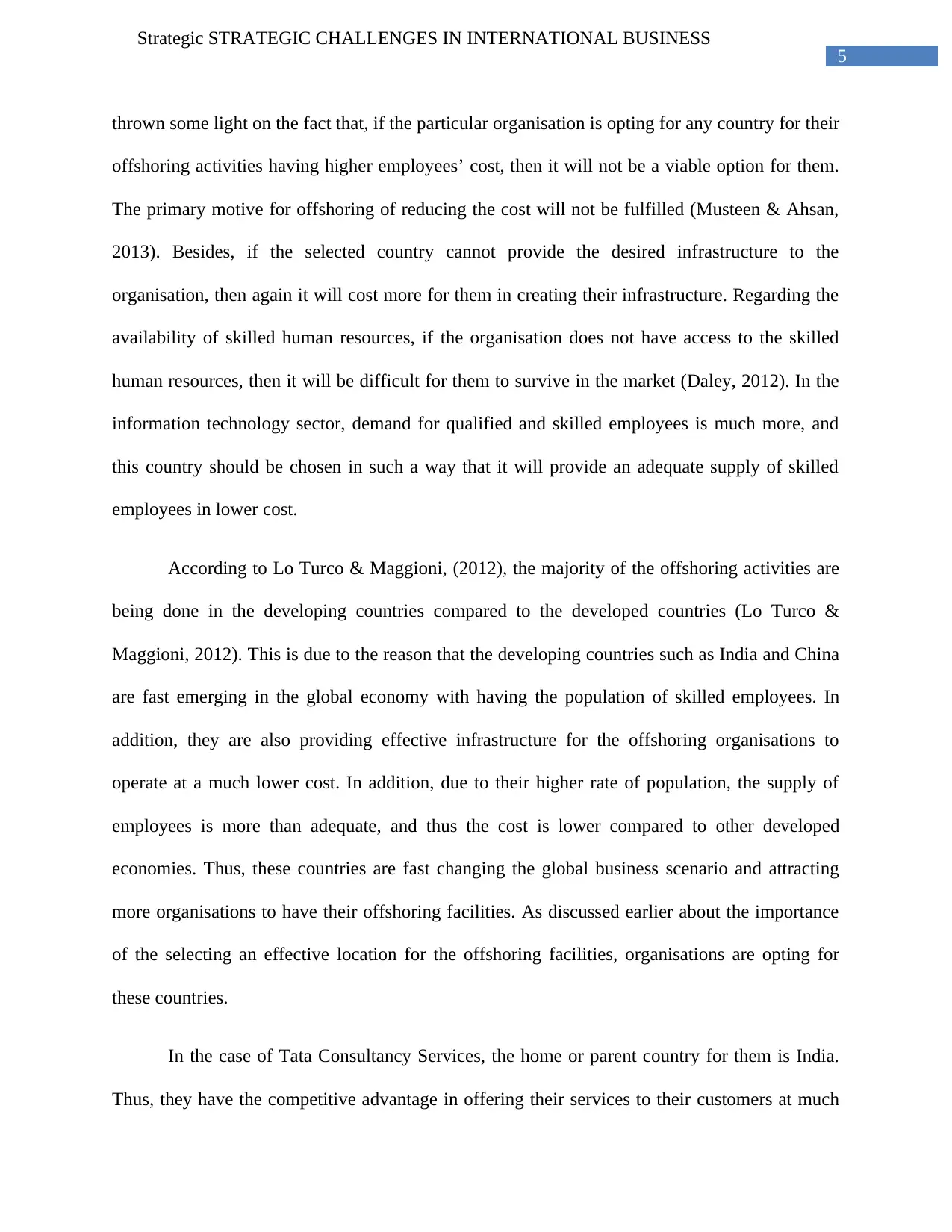
5
Strategic STRATEGIC CHALLENGES IN INTERNATIONAL BUSINESS
thrown some light on the fact that, if the particular organisation is opting for any country for their
offshoring activities having higher employees’ cost, then it will not be a viable option for them.
The primary motive for offshoring of reducing the cost will not be fulfilled (Musteen & Ahsan,
2013). Besides, if the selected country cannot provide the desired infrastructure to the
organisation, then again it will cost more for them in creating their infrastructure. Regarding the
availability of skilled human resources, if the organisation does not have access to the skilled
human resources, then it will be difficult for them to survive in the market (Daley, 2012). In the
information technology sector, demand for qualified and skilled employees is much more, and
this country should be chosen in such a way that it will provide an adequate supply of skilled
employees in lower cost.
According to Lo Turco & Maggioni, (2012), the majority of the offshoring activities are
being done in the developing countries compared to the developed countries (Lo Turco &
Maggioni, 2012). This is due to the reason that the developing countries such as India and China
are fast emerging in the global economy with having the population of skilled employees. In
addition, they are also providing effective infrastructure for the offshoring organisations to
operate at a much lower cost. In addition, due to their higher rate of population, the supply of
employees is more than adequate, and thus the cost is lower compared to other developed
economies. Thus, these countries are fast changing the global business scenario and attracting
more organisations to have their offshoring facilities. As discussed earlier about the importance
of the selecting an effective location for the offshoring facilities, organisations are opting for
these countries.
In the case of Tata Consultancy Services, the home or parent country for them is India.
Thus, they have the competitive advantage in offering their services to their customers at much
Strategic STRATEGIC CHALLENGES IN INTERNATIONAL BUSINESS
thrown some light on the fact that, if the particular organisation is opting for any country for their
offshoring activities having higher employees’ cost, then it will not be a viable option for them.
The primary motive for offshoring of reducing the cost will not be fulfilled (Musteen & Ahsan,
2013). Besides, if the selected country cannot provide the desired infrastructure to the
organisation, then again it will cost more for them in creating their infrastructure. Regarding the
availability of skilled human resources, if the organisation does not have access to the skilled
human resources, then it will be difficult for them to survive in the market (Daley, 2012). In the
information technology sector, demand for qualified and skilled employees is much more, and
this country should be chosen in such a way that it will provide an adequate supply of skilled
employees in lower cost.
According to Lo Turco & Maggioni, (2012), the majority of the offshoring activities are
being done in the developing countries compared to the developed countries (Lo Turco &
Maggioni, 2012). This is due to the reason that the developing countries such as India and China
are fast emerging in the global economy with having the population of skilled employees. In
addition, they are also providing effective infrastructure for the offshoring organisations to
operate at a much lower cost. In addition, due to their higher rate of population, the supply of
employees is more than adequate, and thus the cost is lower compared to other developed
economies. Thus, these countries are fast changing the global business scenario and attracting
more organisations to have their offshoring facilities. As discussed earlier about the importance
of the selecting an effective location for the offshoring facilities, organisations are opting for
these countries.
In the case of Tata Consultancy Services, the home or parent country for them is India.
Thus, they have the competitive advantage in offering their services to their customers at much
⊘ This is a preview!⊘
Do you want full access?
Subscribe today to unlock all pages.

Trusted by 1+ million students worldwide
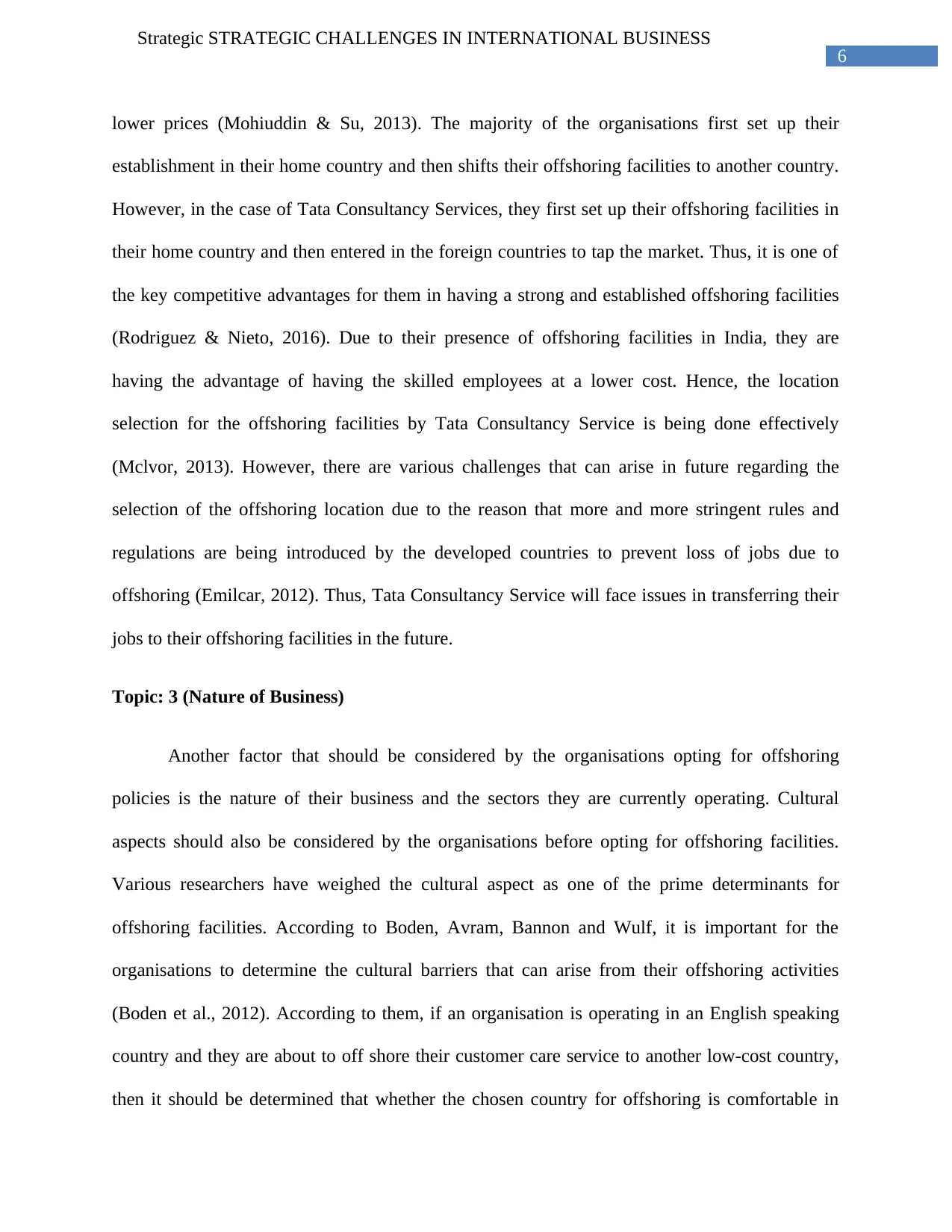
6
Strategic STRATEGIC CHALLENGES IN INTERNATIONAL BUSINESS
lower prices (Mohiuddin & Su, 2013). The majority of the organisations first set up their
establishment in their home country and then shifts their offshoring facilities to another country.
However, in the case of Tata Consultancy Services, they first set up their offshoring facilities in
their home country and then entered in the foreign countries to tap the market. Thus, it is one of
the key competitive advantages for them in having a strong and established offshoring facilities
(Rodriguez & Nieto, 2016). Due to their presence of offshoring facilities in India, they are
having the advantage of having the skilled employees at a lower cost. Hence, the location
selection for the offshoring facilities by Tata Consultancy Service is being done effectively
(Mclvor, 2013). However, there are various challenges that can arise in future regarding the
selection of the offshoring location due to the reason that more and more stringent rules and
regulations are being introduced by the developed countries to prevent loss of jobs due to
offshoring (Emilcar, 2012). Thus, Tata Consultancy Service will face issues in transferring their
jobs to their offshoring facilities in the future.
Topic: 3 (Nature of Business)
Another factor that should be considered by the organisations opting for offshoring
policies is the nature of their business and the sectors they are currently operating. Cultural
aspects should also be considered by the organisations before opting for offshoring facilities.
Various researchers have weighed the cultural aspect as one of the prime determinants for
offshoring facilities. According to Boden, Avram, Bannon and Wulf, it is important for the
organisations to determine the cultural barriers that can arise from their offshoring activities
(Boden et al., 2012). According to them, if an organisation is operating in an English speaking
country and they are about to off shore their customer care service to another low-cost country,
then it should be determined that whether the chosen country for offshoring is comfortable in
Strategic STRATEGIC CHALLENGES IN INTERNATIONAL BUSINESS
lower prices (Mohiuddin & Su, 2013). The majority of the organisations first set up their
establishment in their home country and then shifts their offshoring facilities to another country.
However, in the case of Tata Consultancy Services, they first set up their offshoring facilities in
their home country and then entered in the foreign countries to tap the market. Thus, it is one of
the key competitive advantages for them in having a strong and established offshoring facilities
(Rodriguez & Nieto, 2016). Due to their presence of offshoring facilities in India, they are
having the advantage of having the skilled employees at a lower cost. Hence, the location
selection for the offshoring facilities by Tata Consultancy Service is being done effectively
(Mclvor, 2013). However, there are various challenges that can arise in future regarding the
selection of the offshoring location due to the reason that more and more stringent rules and
regulations are being introduced by the developed countries to prevent loss of jobs due to
offshoring (Emilcar, 2012). Thus, Tata Consultancy Service will face issues in transferring their
jobs to their offshoring facilities in the future.
Topic: 3 (Nature of Business)
Another factor that should be considered by the organisations opting for offshoring
policies is the nature of their business and the sectors they are currently operating. Cultural
aspects should also be considered by the organisations before opting for offshoring facilities.
Various researchers have weighed the cultural aspect as one of the prime determinants for
offshoring facilities. According to Boden, Avram, Bannon and Wulf, it is important for the
organisations to determine the cultural barriers that can arise from their offshoring activities
(Boden et al., 2012). According to them, if an organisation is operating in an English speaking
country and they are about to off shore their customer care service to another low-cost country,
then it should be determined that whether the chosen country for offshoring is comfortable in
Paraphrase This Document
Need a fresh take? Get an instant paraphrase of this document with our AI Paraphraser
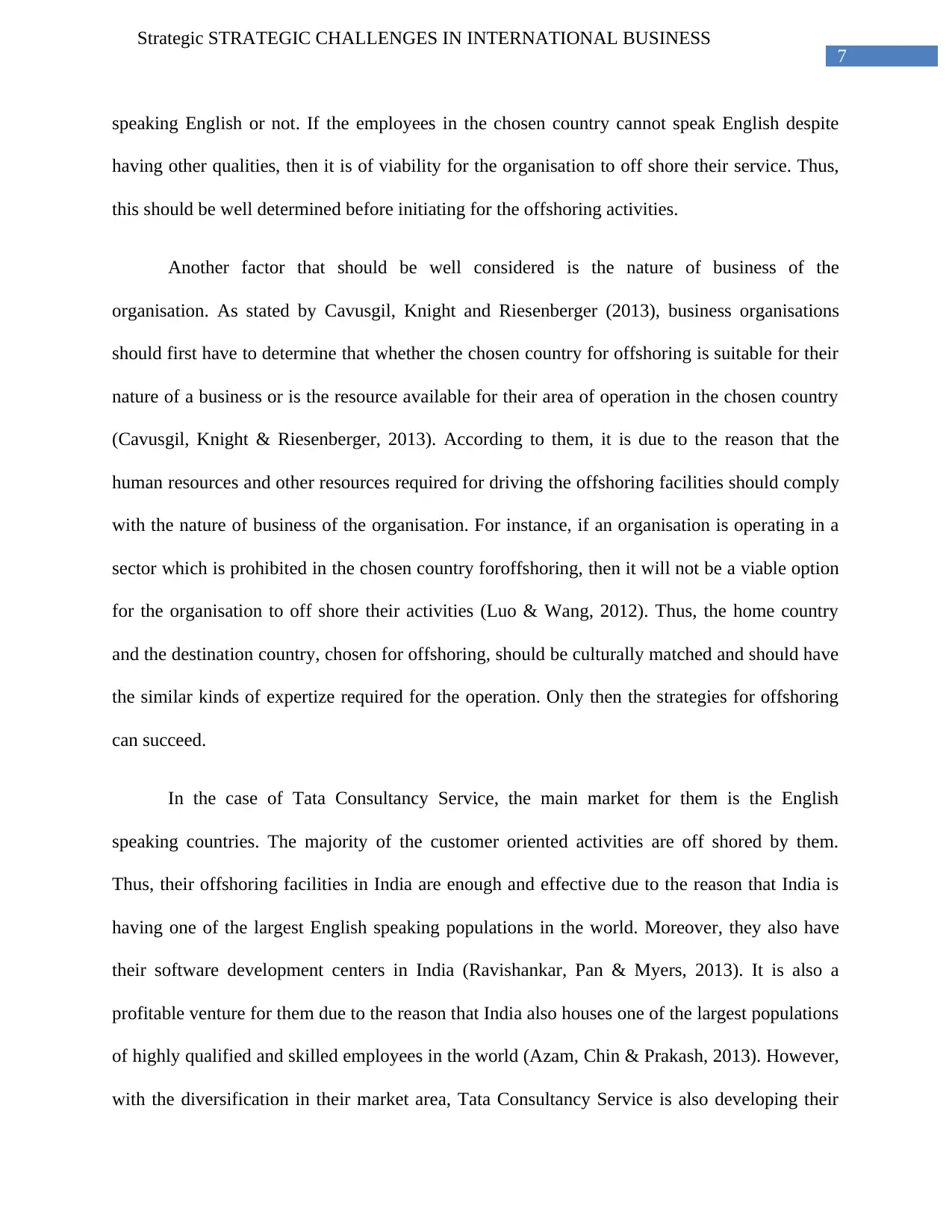
7
Strategic STRATEGIC CHALLENGES IN INTERNATIONAL BUSINESS
speaking English or not. If the employees in the chosen country cannot speak English despite
having other qualities, then it is of viability for the organisation to off shore their service. Thus,
this should be well determined before initiating for the offshoring activities.
Another factor that should be well considered is the nature of business of the
organisation. As stated by Cavusgil, Knight and Riesenberger (2013), business organisations
should first have to determine that whether the chosen country for offshoring is suitable for their
nature of a business or is the resource available for their area of operation in the chosen country
(Cavusgil, Knight & Riesenberger, 2013). According to them, it is due to the reason that the
human resources and other resources required for driving the offshoring facilities should comply
with the nature of business of the organisation. For instance, if an organisation is operating in a
sector which is prohibited in the chosen country foroffshoring, then it will not be a viable option
for the organisation to off shore their activities (Luo & Wang, 2012). Thus, the home country
and the destination country, chosen for offshoring, should be culturally matched and should have
the similar kinds of expertize required for the operation. Only then the strategies for offshoring
can succeed.
In the case of Tata Consultancy Service, the main market for them is the English
speaking countries. The majority of the customer oriented activities are off shored by them.
Thus, their offshoring facilities in India are enough and effective due to the reason that India is
having one of the largest English speaking populations in the world. Moreover, they also have
their software development centers in India (Ravishankar, Pan & Myers, 2013). It is also a
profitable venture for them due to the reason that India also houses one of the largest populations
of highly qualified and skilled employees in the world (Azam, Chin & Prakash, 2013). However,
with the diversification in their market area, Tata Consultancy Service is also developing their
Strategic STRATEGIC CHALLENGES IN INTERNATIONAL BUSINESS
speaking English or not. If the employees in the chosen country cannot speak English despite
having other qualities, then it is of viability for the organisation to off shore their service. Thus,
this should be well determined before initiating for the offshoring activities.
Another factor that should be well considered is the nature of business of the
organisation. As stated by Cavusgil, Knight and Riesenberger (2013), business organisations
should first have to determine that whether the chosen country for offshoring is suitable for their
nature of a business or is the resource available for their area of operation in the chosen country
(Cavusgil, Knight & Riesenberger, 2013). According to them, it is due to the reason that the
human resources and other resources required for driving the offshoring facilities should comply
with the nature of business of the organisation. For instance, if an organisation is operating in a
sector which is prohibited in the chosen country foroffshoring, then it will not be a viable option
for the organisation to off shore their activities (Luo & Wang, 2012). Thus, the home country
and the destination country, chosen for offshoring, should be culturally matched and should have
the similar kinds of expertize required for the operation. Only then the strategies for offshoring
can succeed.
In the case of Tata Consultancy Service, the main market for them is the English
speaking countries. The majority of the customer oriented activities are off shored by them.
Thus, their offshoring facilities in India are enough and effective due to the reason that India is
having one of the largest English speaking populations in the world. Moreover, they also have
their software development centers in India (Ravishankar, Pan & Myers, 2013). It is also a
profitable venture for them due to the reason that India also houses one of the largest populations
of highly qualified and skilled employees in the world (Azam, Chin & Prakash, 2013). However,
with the diversification in their market area, Tata Consultancy Service is also developing their
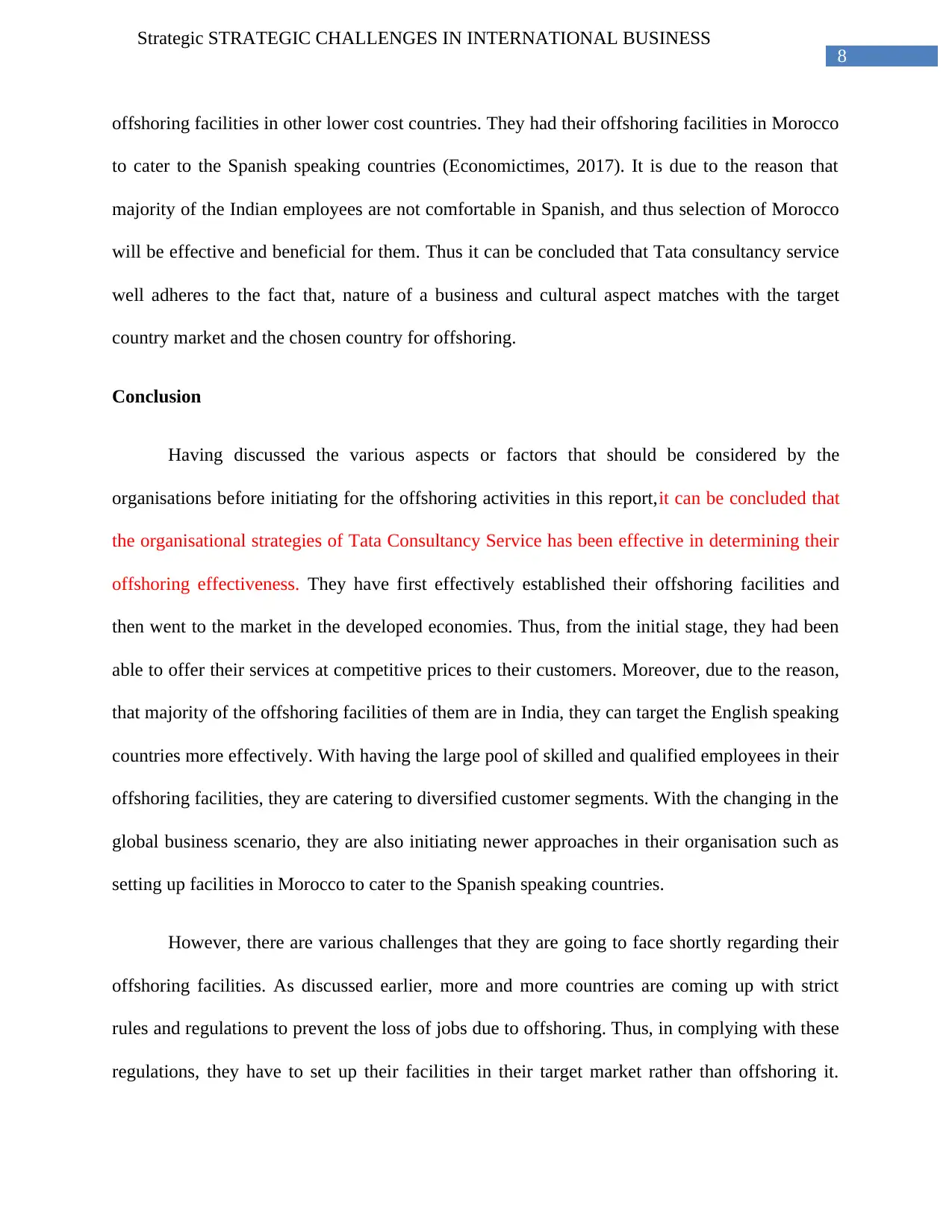
8
Strategic STRATEGIC CHALLENGES IN INTERNATIONAL BUSINESS
offshoring facilities in other lower cost countries. They had their offshoring facilities in Morocco
to cater to the Spanish speaking countries (Economictimes, 2017). It is due to the reason that
majority of the Indian employees are not comfortable in Spanish, and thus selection of Morocco
will be effective and beneficial for them. Thus it can be concluded that Tata consultancy service
well adheres to the fact that, nature of a business and cultural aspect matches with the target
country market and the chosen country for offshoring.
Conclusion
Having discussed the various aspects or factors that should be considered by the
organisations before initiating for the offshoring activities in this report,it can be concluded that
the organisational strategies of Tata Consultancy Service has been effective in determining their
offshoring effectiveness. They have first effectively established their offshoring facilities and
then went to the market in the developed economies. Thus, from the initial stage, they had been
able to offer their services at competitive prices to their customers. Moreover, due to the reason,
that majority of the offshoring facilities of them are in India, they can target the English speaking
countries more effectively. With having the large pool of skilled and qualified employees in their
offshoring facilities, they are catering to diversified customer segments. With the changing in the
global business scenario, they are also initiating newer approaches in their organisation such as
setting up facilities in Morocco to cater to the Spanish speaking countries.
However, there are various challenges that they are going to face shortly regarding their
offshoring facilities. As discussed earlier, more and more countries are coming up with strict
rules and regulations to prevent the loss of jobs due to offshoring. Thus, in complying with these
regulations, they have to set up their facilities in their target market rather than offshoring it.
Strategic STRATEGIC CHALLENGES IN INTERNATIONAL BUSINESS
offshoring facilities in other lower cost countries. They had their offshoring facilities in Morocco
to cater to the Spanish speaking countries (Economictimes, 2017). It is due to the reason that
majority of the Indian employees are not comfortable in Spanish, and thus selection of Morocco
will be effective and beneficial for them. Thus it can be concluded that Tata consultancy service
well adheres to the fact that, nature of a business and cultural aspect matches with the target
country market and the chosen country for offshoring.
Conclusion
Having discussed the various aspects or factors that should be considered by the
organisations before initiating for the offshoring activities in this report,it can be concluded that
the organisational strategies of Tata Consultancy Service has been effective in determining their
offshoring effectiveness. They have first effectively established their offshoring facilities and
then went to the market in the developed economies. Thus, from the initial stage, they had been
able to offer their services at competitive prices to their customers. Moreover, due to the reason,
that majority of the offshoring facilities of them are in India, they can target the English speaking
countries more effectively. With having the large pool of skilled and qualified employees in their
offshoring facilities, they are catering to diversified customer segments. With the changing in the
global business scenario, they are also initiating newer approaches in their organisation such as
setting up facilities in Morocco to cater to the Spanish speaking countries.
However, there are various challenges that they are going to face shortly regarding their
offshoring facilities. As discussed earlier, more and more countries are coming up with strict
rules and regulations to prevent the loss of jobs due to offshoring. Thus, in complying with these
regulations, they have to set up their facilities in their target market rather than offshoring it.
⊘ This is a preview!⊘
Do you want full access?
Subscribe today to unlock all pages.

Trusted by 1+ million students worldwide
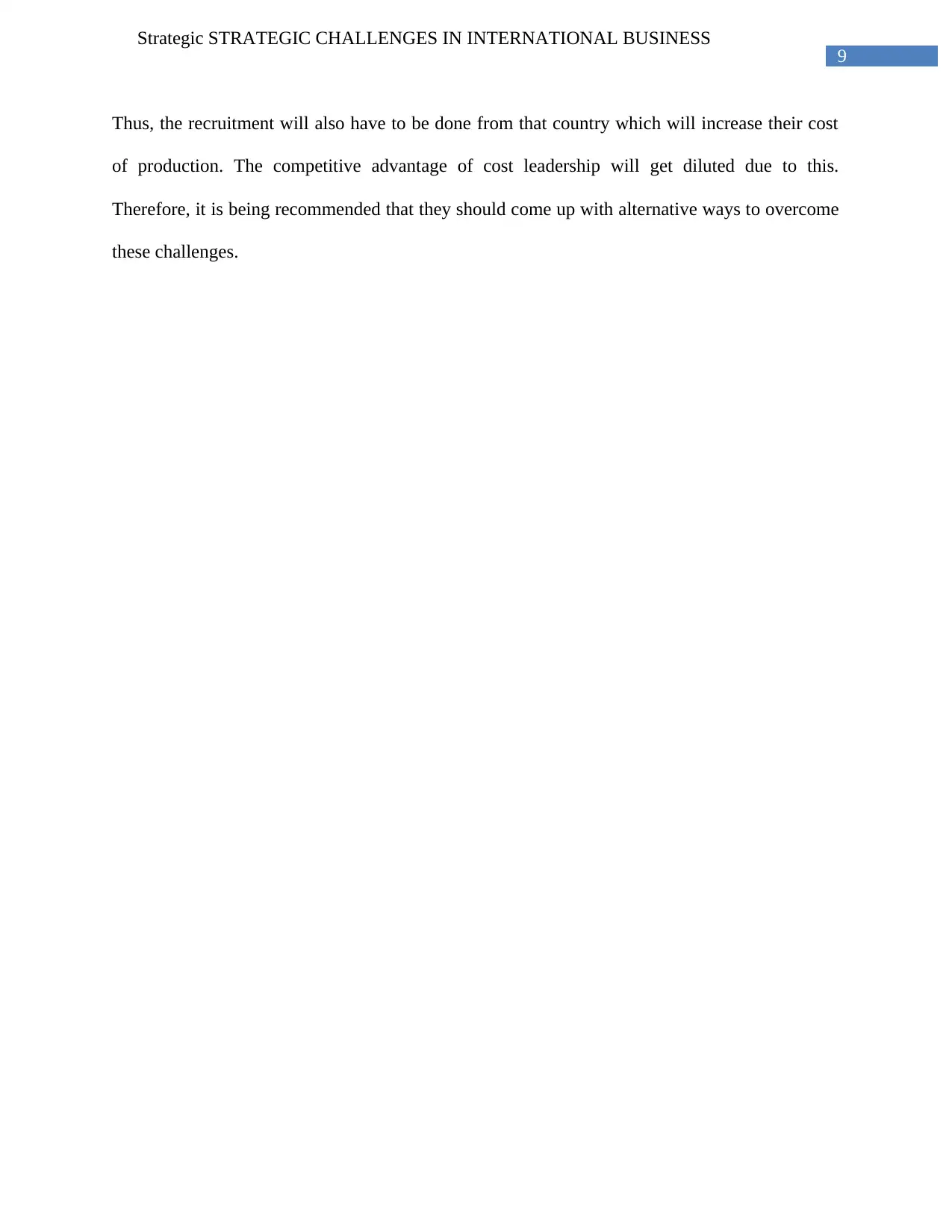
9
Strategic STRATEGIC CHALLENGES IN INTERNATIONAL BUSINESS
Thus, the recruitment will also have to be done from that country which will increase their cost
of production. The competitive advantage of cost leadership will get diluted due to this.
Therefore, it is being recommended that they should come up with alternative ways to overcome
these challenges.
Strategic STRATEGIC CHALLENGES IN INTERNATIONAL BUSINESS
Thus, the recruitment will also have to be done from that country which will increase their cost
of production. The competitive advantage of cost leadership will get diluted due to this.
Therefore, it is being recommended that they should come up with alternative ways to overcome
these challenges.
Paraphrase This Document
Need a fresh take? Get an instant paraphrase of this document with our AI Paraphraser
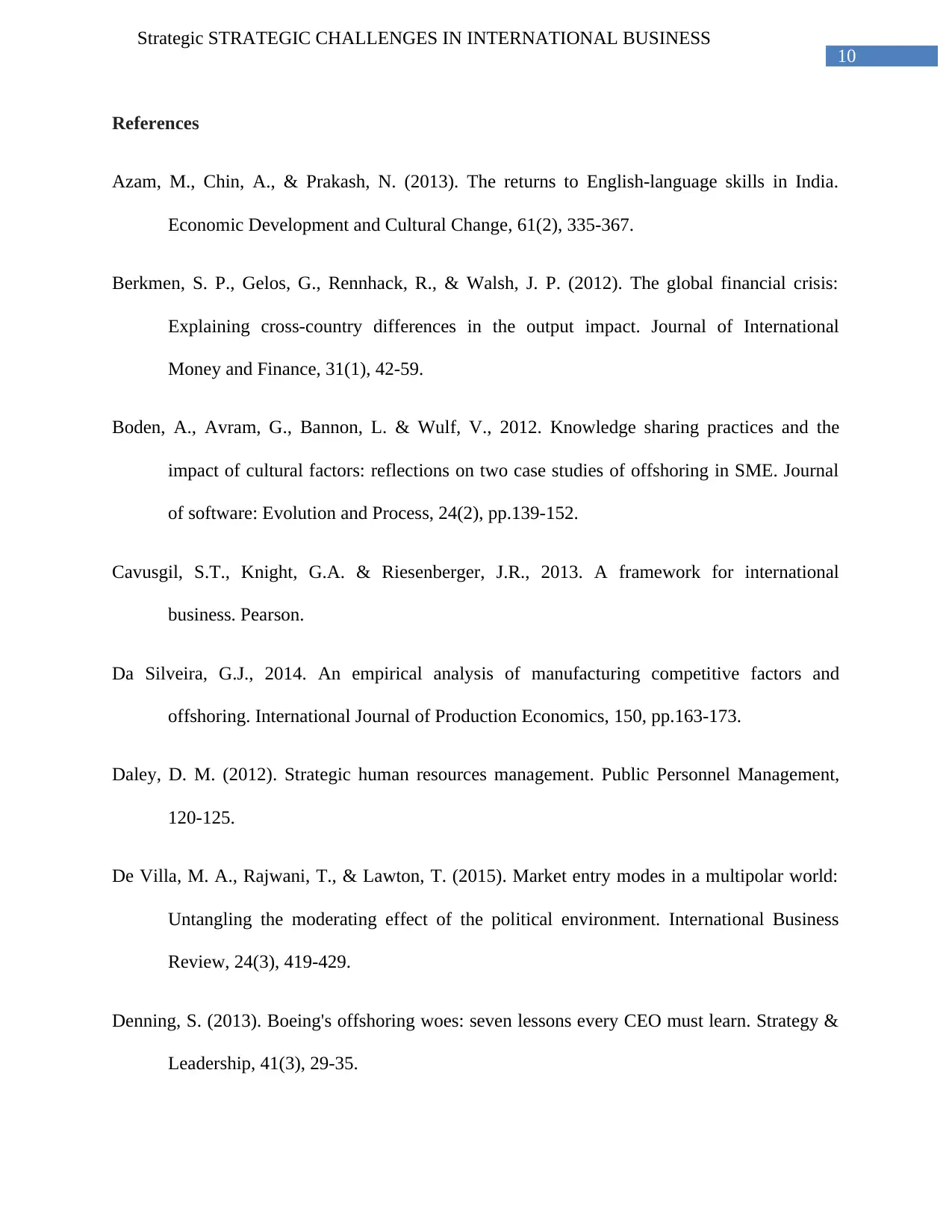
10
Strategic STRATEGIC CHALLENGES IN INTERNATIONAL BUSINESS
References
Azam, M., Chin, A., & Prakash, N. (2013). The returns to English-language skills in India.
Economic Development and Cultural Change, 61(2), 335-367.
Berkmen, S. P., Gelos, G., Rennhack, R., & Walsh, J. P. (2012). The global financial crisis:
Explaining cross-country differences in the output impact. Journal of International
Money and Finance, 31(1), 42-59.
Boden, A., Avram, G., Bannon, L. & Wulf, V., 2012. Knowledge sharing practices and the
impact of cultural factors: reflections on two case studies of offshoring in SME. Journal
of software: Evolution and Process, 24(2), pp.139-152.
Cavusgil, S.T., Knight, G.A. & Riesenberger, J.R., 2013. A framework for international
business. Pearson.
Da Silveira, G.J., 2014. An empirical analysis of manufacturing competitive factors and
offshoring. International Journal of Production Economics, 150, pp.163-173.
Daley, D. M. (2012). Strategic human resources management. Public Personnel Management,
120-125.
De Villa, M. A., Rajwani, T., & Lawton, T. (2015). Market entry modes in a multipolar world:
Untangling the moderating effect of the political environment. International Business
Review, 24(3), 419-429.
Denning, S. (2013). Boeing's offshoring woes: seven lessons every CEO must learn. Strategy &
Leadership, 41(3), 29-35.
Strategic STRATEGIC CHALLENGES IN INTERNATIONAL BUSINESS
References
Azam, M., Chin, A., & Prakash, N. (2013). The returns to English-language skills in India.
Economic Development and Cultural Change, 61(2), 335-367.
Berkmen, S. P., Gelos, G., Rennhack, R., & Walsh, J. P. (2012). The global financial crisis:
Explaining cross-country differences in the output impact. Journal of International
Money and Finance, 31(1), 42-59.
Boden, A., Avram, G., Bannon, L. & Wulf, V., 2012. Knowledge sharing practices and the
impact of cultural factors: reflections on two case studies of offshoring in SME. Journal
of software: Evolution and Process, 24(2), pp.139-152.
Cavusgil, S.T., Knight, G.A. & Riesenberger, J.R., 2013. A framework for international
business. Pearson.
Da Silveira, G.J., 2014. An empirical analysis of manufacturing competitive factors and
offshoring. International Journal of Production Economics, 150, pp.163-173.
Daley, D. M. (2012). Strategic human resources management. Public Personnel Management,
120-125.
De Villa, M. A., Rajwani, T., & Lawton, T. (2015). Market entry modes in a multipolar world:
Untangling the moderating effect of the political environment. International Business
Review, 24(3), 419-429.
Denning, S. (2013). Boeing's offshoring woes: seven lessons every CEO must learn. Strategy &
Leadership, 41(3), 29-35.

11
Strategic STRATEGIC CHALLENGES IN INTERNATIONAL BUSINESS
Dhaliwal, I., Duflo, E., Glennerster, R., & Tulloch, C. (2013). Comparative cost-effectiveness
analysis to inform policy in developing countries: a general framework with applications
for education. Education Policy in Developing Countries, 285-338.
Ellram, L.M., Tate, W.L. & Petersen, K.J., 2013. Offshoring and reshoring: an update on the
manufacturing location decision. Journal of Supply Chain Management, 49(2), pp.14-22.
Emilcar, J. (2012). A Proposal to Prevent Offshoring: An Analysis of the Latest Anti-Offshoring
Proposals. J. Int'l Bus. & L., 11, 205.
España, J., 2013. The real costs of offshoring. Journal of Business and Behavior Sciences, 25(2),
p.40.
Larsen, M.M., Manning, S. & Pedersen, T., 2013. Uncovering the hidden costs of offshoring:
The interplay of complexity, organisational design, and experience. Strategic
Management Journal, 34(5), pp.533-552.
Levchenko, A. A., & Zhang, J. (2016). The evolution of comparative advantage: Measurement
and welfare implications. Journal of Monetary Economics, 78, 96-111.
Lo Turco, A. & Maggioni, D., 2012. Offshoring to high and low income countries and the labor
demand. Evidence from Italian firms. Review of International Economics, 20(3), pp.636-
653.
Luo, Y., & Wang, S. L. (2012). Foreign direct investment strategies by developing country
multinationals: A diagnostic model for home country effects. Global Strategy Journal,
2(3), 244-261.
Strategic STRATEGIC CHALLENGES IN INTERNATIONAL BUSINESS
Dhaliwal, I., Duflo, E., Glennerster, R., & Tulloch, C. (2013). Comparative cost-effectiveness
analysis to inform policy in developing countries: a general framework with applications
for education. Education Policy in Developing Countries, 285-338.
Ellram, L.M., Tate, W.L. & Petersen, K.J., 2013. Offshoring and reshoring: an update on the
manufacturing location decision. Journal of Supply Chain Management, 49(2), pp.14-22.
Emilcar, J. (2012). A Proposal to Prevent Offshoring: An Analysis of the Latest Anti-Offshoring
Proposals. J. Int'l Bus. & L., 11, 205.
España, J., 2013. The real costs of offshoring. Journal of Business and Behavior Sciences, 25(2),
p.40.
Larsen, M.M., Manning, S. & Pedersen, T., 2013. Uncovering the hidden costs of offshoring:
The interplay of complexity, organisational design, and experience. Strategic
Management Journal, 34(5), pp.533-552.
Levchenko, A. A., & Zhang, J. (2016). The evolution of comparative advantage: Measurement
and welfare implications. Journal of Monetary Economics, 78, 96-111.
Lo Turco, A. & Maggioni, D., 2012. Offshoring to high and low income countries and the labor
demand. Evidence from Italian firms. Review of International Economics, 20(3), pp.636-
653.
Luo, Y., & Wang, S. L. (2012). Foreign direct investment strategies by developing country
multinationals: A diagnostic model for home country effects. Global Strategy Journal,
2(3), 244-261.
⊘ This is a preview!⊘
Do you want full access?
Subscribe today to unlock all pages.

Trusted by 1+ million students worldwide
1 out of 14
Related Documents
Your All-in-One AI-Powered Toolkit for Academic Success.
+13062052269
info@desklib.com
Available 24*7 on WhatsApp / Email
![[object Object]](/_next/static/media/star-bottom.7253800d.svg)
Unlock your academic potential
Copyright © 2020–2026 A2Z Services. All Rights Reserved. Developed and managed by ZUCOL.





